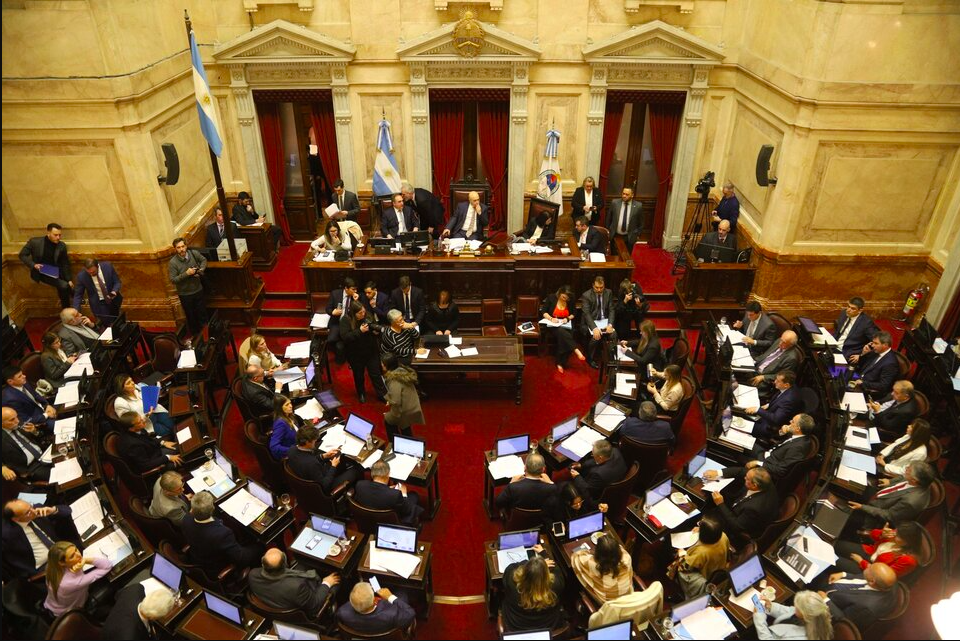
Published 08/23/2024 16:46
Argentine President Javier Milei is expected to veto the pension reform approved by the Senate on Thursday (22), a measure that will likely deepen the confrontation between the far-right leader and the Congress, which is largely controlled by the opposition. “Every time the degenerate political prosecutors want to disrupt the fiscal balance, I will veto everything, I don’t give a damn,” the president said about the bill that was being processed in Congress.
The Senate approved an increase in pension spending, bringing it in line with the triple-digit inflation that is plaguing the country. The vote, with a score of 61 to 8, demonstrated the strength of the opposition, which seeks to challenge the president’s rigid austerity program. Only one of the dissenting votes came from outside Milei’s party, highlighting the president’s difficulty in negotiating with centrist parties.
Milei, who took office in December promising to adopt strict austerity measures to combat runaway inflation and growing poverty, has not hesitated to voice her opposition to the bill. In a statement published on the X platform, Milei’s office said the proposal’s sole aim was to “destroy the government’s economic program,” adding that the measure would require a 1.2 percent increase in gross domestic product (GDP) to be implemented.
“The president promised Argentines that he would maintain a fiscal surplus at all costs, and he will do so,” the cabinet said, reaffirming Milei’s commitment to a “zero deficit” and the rejection of any legislation that could jeopardize public finances.
The Senate defeat reinforced Milei’s political fragility, as he has faced a tough battle to implement his agenda in Congress. With less than 15 percent control of both houses of Congress — only seven of the 72 Senate seats belong to his party — the president has largely relied on executive orders to advance his policies, often without the necessary support from the legislature.
Last week, Congress overturned a presidential decree that would have increased the intelligence budget, arguing that those resources could be better spent on urgent social needs. The decision came as a significant setback for Milei, who finds himself increasingly limited in his ability to govern with the legislature stacked against him.
After six months in office, Milei had secured his first legislative victory in June when his economic reform bill narrowly passed the Senate despite clashes between protesters and police. However, the recent approval of a pension reform, which would see retirement benefits increase by more than 8% later this year, has rekindled concerns among investors about the viability of his radical agenda.
In his first six months in office, Milei managed to achieve a rare fiscal surplus by cutting public spending, halting public works projects and reducing revenue transfers to the provinces. However, the austerity policies also worsened the economic recession, pushing poverty to 55% and causing annual inflation to soar to 260%.
Marcelo J Garcia, Americas director at Horizon Engage, a New York-based political risk consultancy, said the pension reform is particularly sensitive as it directly impacts the core of Milei’s fiscal program. “What worries investors the most is that this negative wave is a result of the hardline and more confrontational side of Milei’s inner circle taking over,” he said.
The possibility of Milei vetoing the pension reform and the response of Congress — which could overturn the veto with a two-thirds majority — will define the next chapters of this clash, with the potential to further increase political and economic tensions in Argentina.
To override a veto, both chambers must obtain an absolute majority of two-thirds of the votes of the members present. If this is achieved, the bill is enacted and the presidential veto is overturned, forcing the executive to enact the law. Courts may review the constitutionality of a veto if it is argued that it affects fundamental rights or violates international treaties.
Source: vermelho.org.br

